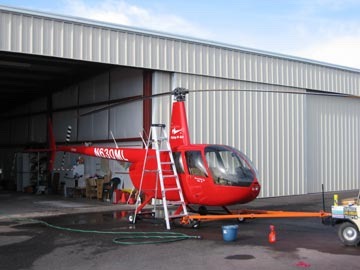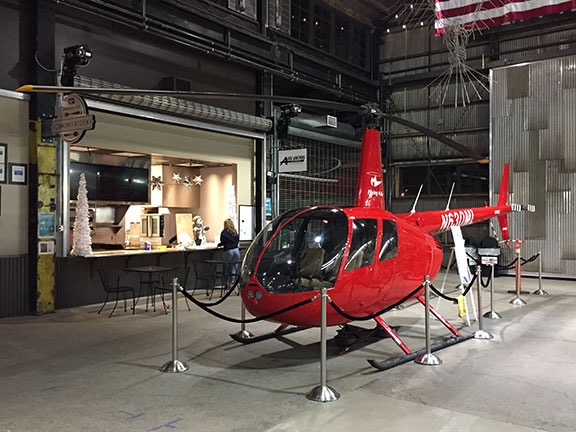Why I like to keep my helicopter clean.
The other day, I did a Santa flight. When I landed and shut down, one of the many people who’d crowded around the helicopter for a closer look commented on how clean and shiny it was. Although I thanked her, I didn’t say what I was really thinking: it was filthy.
That was my opinion and it wasn’t shared by many others. I’m often complemented on how good my helicopter looks. Just the other day, a pilot friend from Oregon stopped by and he said pretty much the same thing. I pointed out the smashed bugs on the mast and leg fairings and the grime on the back panel near the tailpipe. He then saw what I saw and conceded that it could use some cleaning.
Indeed, it had not been washed with a hose in more than two years.
Keeping it Clean

This photo from 2006 shows my wash setup back in Arizona.
Back when I was still living in Arizona, I’d take it out a few times a year with a hose and sponges and a ladder and give it a good cleaning, from back to front and top to bottom. It was quite a chore and often took as much as two hours. I had to time it right so the sun wasn’t full on it and I could towel it dry before water droplet stains could form. Often, I’d finish it off with a coat of RV spray wax. Occasionally someone would help, but more often than not, they didn’t seem as interested as I was in getting it perfectly clean — or as close to perfection as possible.
Since January 2013, my helicopter has been bouncing from Washington to California and back to Washington on various agricultural flying contracts. It lived outdoors for months at a time, spending the winter of 2013/14 in a Wenatchee Airport hangar before settling into its permanent space in my RV garage at home only two months ago. The last time I washed it was when it still lived in Arizona, back in 2012. Since then, I’ve had to satisfy myself by wiping it down with a microfiber cloth after a heavy rain. That took care of most of the dust and some of the bugs. Spot cleaning took care of the rest.
Although my building has a handy drain in the floor and a hose spigot indoors, I haven’t gotten around to washing it in there — mostly because it’s too cold this time of year for it to dry properly. I expect I’ll be washing it indoors once in a while when spring comes. Otherwise, I can wash it outdoors on its landing pad in the summer, when the late afternoon sun sinks behind my building and leaves the driveway apron in the shade. That’s the plan anyway.
My Prized Possession
Why is it so important for me to keep it clean? It’s simple: I’m proud of it. It’s my prized possession.
Please understand that it’s not really the value of the helicopter that makes me so proud. At this point, it’s 10 years old. Both the house I still (unfortunately) own with my wasband and my current home are worth more (although the helicopter was once worth more than either one). Resale value does not make it a prized possession.
Instead, it’s what the helicopter represents: the result of hard work, smart investments, and a never-ending drive to make my business grow and thrive with good-paying work.
I look at the helicopter and I see long days sitting in front of a computer, writing book after book for my publishers. I wrote or revised 85 books in 20 years. Because they were computer how-to books, they had tight deadlines. How many 12-hour days and 7-day workweeks did I spend in my office banging away on a keyboard to meet a deadline? Too many to count. And don’t even get me started about the 12 summers in a row that I spent mostly indoors, working to meet deadlines for my Quicken books. It was only because a handful of my titles became bestsellers that the money started flowing in. That money made it possible to buy my first helicopter, a much smaller two seater that I put 1000 hours of flight time on in just five years.
I look at the helicopter and I see real estate investments I bought to explore a role as a landlord. The property with a two-bedroom home and four furnished studio apartments that I bought in the early 2000s stands clear in my mind. Yes, I got a good deal on it, but I also poured a lot of time and money into it, improving each furnished unit, showing it to a countless stream of snowbirds and transients, cleaning apartments over and over, dealing with complaints and tenants who couldn’t pay their rent on time or at all. And then the suicide in one apartment followed closely by the suicide of a tenant before she even moved in. (Seriously, I can’t make this shit up.) This property taught me how much I could hate being a landlord. But when I sold it shortly before the peak of the real estate market and pocketed a 50% profit in less than five years, I wasn’t complaining. That money, and the proceeds from the sale of my first helicopter, is what made up the sizable downpayment for my prized possession, making monthly payments for the balance almost affordable.
I look at the helicopter and I see all the ways I tried to build my business and make it profitable. I think about the tours and photo flights I’d do no matter how little revenue they generated. I think about the first few regular clients I got — a Russian photographer who led photo expeditions in the Southwest and needed a pilot over Lake Powell, Monument Valley, and Shiprock; a local addiction treatment center bigwig interested in showing off to client parents and investors by flying them to the desert facility; a proving grounds manager needing an aerial photo pilot who wasn’t afraid to operate in the deadman’s curve; an environmental impact study company that needed to fly hour after hour along cliff faces looking for raptor nests; orchardists who needed protection for their valuable cherry or almond crops. I think about the epiphany I had when I realized that these clients and this work was what would make my company succeed and that I was simply wasting my time trying to attract one-time clients looking for a deal.
I look at the helicopter and I think about all the hard work involved to keep my business profitable. I think of flying through weather to get to a client on schedule, I think of long hours flying slowly along the top of winding canyons, I think of hour after hour hovering low-level over cherry trees, I think about staying in cheap hotel rooms and having to walk three miles with luggage just to get back to the helicopter, I think of living in an RV for months on end. I think about writing proposals, sending out contracts, and tactfully nagging for payment. I think about patiently explaining to a client why he should fly with me instead of a cheaper alternative in a smaller aircraft piloted by a less experienced pilot. I think about networking and getting the word out and landing cherry drying and frost control contracts that finally got me in the niche I needed to ensure long-term profitability. I think about moving my helicopter and my RV between Arizona and Washington state — four 1000+ mile trips each year — usually by myself, year after year in all kinds of weather. And moving them again between Washington State and the Central Valley of California — four 500+ mile trips each year — for the past two years. I think about taking annual check rides with the FAA and dotting all my I’s and crossing all my T’s to satisfy government requirements.
I think about the money I spent on the helicopter since buying it in 2005: $268,000 for maintenance, $123,000 for fuel, $144,000 for insurance, and $47,000 on interest for the helicopter’s loan. I think about those numbers along with the other expenses I’ve had for simply owning the helicopter and operating a business — well over $1,300,000 total in the past 10 years — and how I feel when I explain to a passenger that it costs more to fly a helicopter than just the cost of fuel.

My most memorable flight of all was from Wenatchee, WA to Hillsboro, OR in the summer of 2012; check out the video.
And then I think about the amazing flights I’ve had at the controls over the past ten years. Flying through desert canyons and up or down the California coast. Floating over the clouds at San Francisco, seeing one end of the Golden Gate Bridge poking up through the fog layer. Cruising over Lake Powell at sunrise or sunset as the sun’s first or last light touched the red rock cliffs. Flying along snow-covered hoodoos at Bryce Canyon. Crossing Cascade Mountain ridges above valleys full of clouds. Zipping past weird rock formations in Utah, Arizona, and Nevada. Speeding low across the empty Sonoran desert, over ridges and around tall cacti. Crossing the Navajo Reservation with wild horses and the remains of abandoned hogans below me. Skimming 50 feet above the surface of the Columbia River, waving to boats and water skiers I pass. Chasing race trucks on desert trails and go-fast boats on desert lakes. These are just examples off the top of my mind; a look through my log books would yield dozens of others.
And I remember that none of this would be possible without my prized possession.
And my prize possession wouldn’t be mine without all the hard work and long hours I put into earning the money to buy and keep it.
It’s more than just a costly possession that makes people (erroneously) think I’m rich. It’s a symbol of my achievements in life, the result of working hard and smart for a long, long time. It’s my reward for staying focused and doing what needed to be done, to the best of my ability, to move ahead, even when certain people tried so hard to hold me back.
Catching Up on Cleaning
So yesterday, I took advantage of the big, heated space inside Pybus Public Market, where my prized possession is currently parked. I brought in some Meguiar’s Detailing Spray, Turtle Wax Bug and Tar remover, and clean microfiber cloths. And then I finally cleaned the bugs off the mast and the leading edges of the horizontal and vertical stabilizers, leg fairings, and cockpit. I covered all the painted surfaces with the detailing spray, wiping it with a succession of clean rags that soon got dirty from the thin film of grime that had been on the helicopter’s skin. I worked slowly and carefully while a handful of people wandered by to check out the shiny red thing unexpectedly parked by the south door.

I took a picture when I was finished. (Missed a rag.)
When I was done, it was even shinier.
But I can still see a few bugs I missed on the mast…
